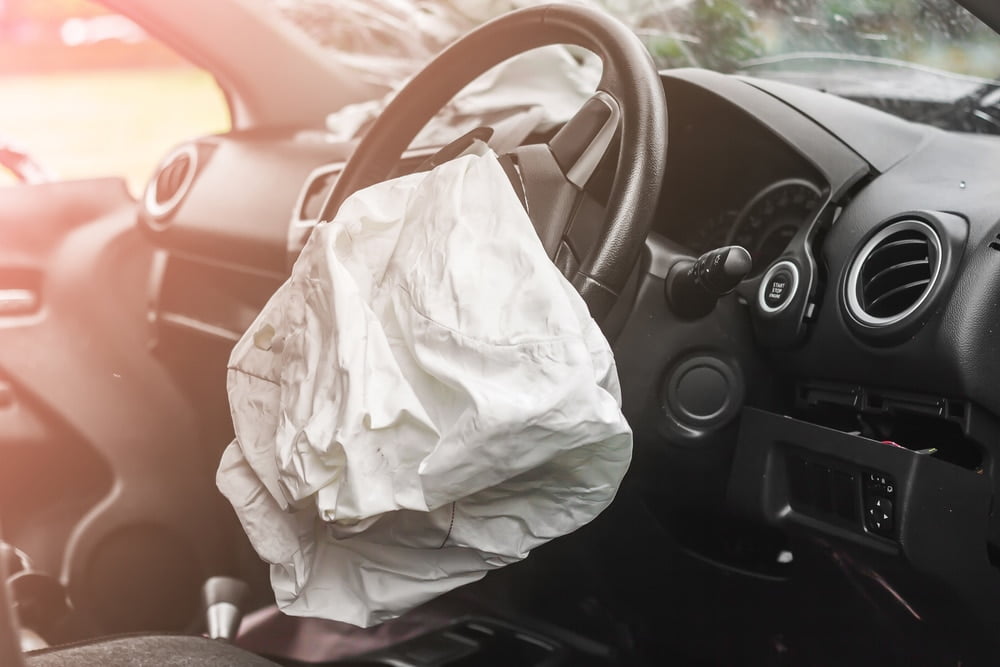If you’ve recently been injured in a car accident, a few key factors may play a role in determining who is liable for the injuries and trauma you’ve suffered. In certain cases, a chief culprit will quickly be identified: Airbags in your vehicle that either failed to deploy entirely or deployed in improper or unsafe ways.
At the offices of William Rawlings & Associates, we’re here to provide high-quality attorney services for any kind of car accident liability case you’re pursuing, including cases where the airbag(s) in your vehicle are a key consideration. What are some reasons why airbags might not deploy, and which steps should you be taking to receive just compensation if you believe your airbags did not deploy properly and contributed to – or even caused – your injuries? Let’s take a look.

Possible Reasons for Failed Airbag Deployment
There are a few different reasons why airbags may not deploy during a vehicle accident. Some of these are either due to the fault of the driver or can’t really be blamed on anyone; others, however, may speak to faultiness with the airbags, the vehicle design or some related element that may implicate another party. Here are some of the most common:
- Impact too low: In some cases, such as for very minor fender-bender type accidents, the sensors in the car may not detect that a collision has occurred with enough force to warrant airbag deployment. In many cases, this is actually a safety feature – it stops the airbags from risking injury during an incident in which they’re not really necessary.
- Out-of-position occupants: If an occupant is positioned too close to the steering wheel or dashboard, or if they’re leaning over into the passenger seat at the time of impact, the airbags may not have room to deploy without causing further injury.
- Objects in the way: If there’s an object – such as a laptop, purse or bag of groceries – resting on the dashboard in front of the airbag, this can block deployment or cause the airbag to inflate improperly. Once again, this is more likely to be a driver error than anything else.
- Airbag sensor malfunction: In some cases, the car’s sensors may fail to detect a collision at all, meaning that the airbags won’t deploy even when they should. This could be due to issues with the sensors themselves or with the wiring connecting them to the airbag control unit.
- Faulty airbag installation: Finally, if the airbags have been installed incorrectly – such as if they were not connected properly to the car’s electrical system – they may fail to deploy when needed.
- Airbag not replaced after prior use: In some cases, an airbag may have been deployed in a previous accident but not replaced. If this happens, the airbag may not inflate correctly or at all the next time it’s needed.
Possible Parties at Fault
As we touched on above, some of the causes of a lack of airbag deployment won’t allow for any kind of liability case. For instance, if you manually turned off your car’s airbags before an accident – as some people do if they’re transporting an infant or small child – then it’s not likely that you’ll be able to sue anyone for injuries related to a lack of airbag deployment.
In other cases, however, another party may definitely be at fault. For example, if a car manufacturer installs faulty sensors in their vehicles, leading to a number of airbag-related injuries, they may be held liable in a class action lawsuit. Similarly, if an auto mechanic installs airbags incorrectly, they may be held liable if those airbags fail to deploy and someone is injured as a result.
There are also cases where the individual manufacturer of the airbag technology itself may be at fault. In these cases, it may be possible to file a product liability claim against the company responsible for making the airbags.
What to Do If You Believe Your Airbags Failed to Deploy
If you’ve been in a car accident and believe that your airbags should have deployed but did not, there are a few steps you should be taking. Here’s a rundown:
- Inform law enforcement of failed deployment: Preserving a record of the incident is important, and law enforcement will make a note in their report if you tell them that your airbags failed to deploy. This could be important evidence later on.
- Get medical attention: Even if you don’t believe you were seriously injured in the accident, it’s always best to err on the side of caution and get checked out by a doctor. Internal injuries are not always immediately apparent, and it’s better to be safe than sorry. And once again, getting medical attention serves as a form of documentation of the incident.
- Gather evidence: Take photos of the accident scene, including any damage to your vehicle. It may also be helpful to get contact information from any witnesses to the accident.
- Talk to a lawyer: An experienced personal injury attorney will be able to assess your case and determine if you have a valid claim against another party. If so, they can help you gather evidence and build a strong case for compensation.
If you or someone you love has been injured in a car accident, it’s important to understand all of your legal options. To learn more about how we can help, contact our staff at the offices of William Rawlings & Associates for assistance with this or any kind of personal injury claim.